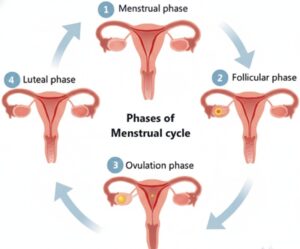10 Risk Factors for High-Risk Pregnancy

When a woman realizes she is pregnant, she may experience delight, excitement, and anticipation. However, if the pregnancy is deemed high-risk, it can be a stressful and anxious time. A high risk pregnancy indicates that additional precautions are required for a healthy and successful pregnancy and delivery.
A high-risk pregnancy poses potential health risks to the mother or baby. While many pregnancies are uncomplicated, certain factors can increase the likelihood of complications. Knowing these risk factors is crucial for early identification and timely intervention.
Women who begin a normal pregnancy may acquire issues that place them in the high-risk group, which occurs in around six to eight percent of all pregnancies. However, over half of all pregnancies are at risk and could benefit from specialized care.
What are the primary risk factors for high-risk pregnancy?
Here are ten common risk factor for high risk pregnancy.
1. Maternal Age:
- Advanced Maternal Age: Women over the age of 35 may experience complications like high blood pressure, gestational diabetes, and chromosomal anomalies.
- Teenage Pregnancy: Younger mothers are at higher risk for premature birth, low birth weight, and complications during labor and delivery.
2. Multiple Pregnancies:
- Twins, Triplets, or More: Carrying multiple babies raises the risk of premature birth, low birth weight, or other complexities.
3. Pre-existing Medical Conditions:
- Chronic Illnesses: Conditions like hypertension, diabetes, heart disease, kidney disorders, thyroid disorders, and autoimmune diseases can complicate pregnancy.
4. Previous Pregnancy Complications:
- History of Miscarriage, Preterm Labor, or Stillbirth: Past complications can increase the risk of similar problems in future pregnancies.
5. Obstetric Complexities:
- Placenta Abruption, Placenta Previa, or Gestational Trophoblastic Disease: These conditions can lead to severe bleeding and other complications.
6. Lifestyle Factors:
- Alcohol Consumption, Smoking, and Drug Use: These habits can cause harm to the developing fetus and increase the chances of birth defects and low birth weight.
- Poor Nutrition: Inadequate nutrient intake can affect fetal growth and development.
- Lack of Prenatal Care: Regular check-ups track the health of both mother and baby.
7. Infection:
- Sexually Transmitted Infections (STIs): Untreated STIs may result in serious complications, such as premature birth defects.
- Other Infections: Infections like cytomegalovirus, rubella, and toxoplasmosis can harm the developing fetus.
8. Genetic Factors:
- Family History of Genetic Disorders: A family history of genetic conditions can increase the risk of passing them on to the child.
9. Occupational Hazards:
- Exposure to Harmful Substances: Radiation, chemicals, or other perilous substances can affect fetal development.
10. Psychological Stress:
- Chronic Stress: Extreme stress can negatively impact pregnancy outcomes.
Recognizing the signs of High-Risk Pregnancy while a healthcare provider can accurately assess your risk, it’s critical to be aware of potential symptoms of high risk pregnancy:
- Frequent or Severe Headaches
- Vision Changes
- Swelling in Hands, Feet, or Face
- Rapid Weight Gain
- Persistent fever or Severe Abdominal Pain
- Vaginal Bleeding
- Reduced Fetal Movement
How is the infant monitored in a high-risk pregnancy?
All babies are routinely examined during pregnancy, but if you are having a high-risk pregnancy, your baby may be monitored even more intensively.
For example, you could undergo more regular ultrasounds or other fetal monitoring procedures. It all relies on your risk factors and how they could endanger your kid. Your doctor may employ the following diagnostic tests to evaluate your baby’s health during a high-risk pregnancy:
- Nonstress. Test tests.
- Contraction Stress Tests
- Biophysical Profiles
- Fetal Movement Counts
- Ultrasound with Doppler (to inspect the umbilical cord).
Can you prevent a high risk pregnancy?
You can avoid some of the factors that put you at greater risk of pregnancy. Others cannot be prevented. For example, pre-existing medical issues are frequently unavoidable throughout pregnancy.
Certain lifestyle variables, such as smoking, alcohol consumption, and weight management, can be addressed before and throughout pregnancy care to reduce the chance of problems.
If you are considering becoming pregnant and know you have manageable risk factors, consult with a healthcare expert. You can follow lifestyle modifications to improve your chances of a low-risk pregnancy.
Consult Dr. Aparna Gumma for unmatched help with high risk pregnancy
Receiving the diagnosis of a high-risk pregnancy might be terrifying, but there is hope. Knowing what’s going on with your pregnancy and health allows you to take the appropriate precautions.
If you have any concerns about your pregnancy or suspect you may be at high risk, consult Dr. Aparna Gumma, a renowned cinsultant obstetrician & gynecologist in Dubai. Dr Aparna’s expertise in high-risk complex pregnancies and advanced surgical techniques laparoscopic techniques ensures optimal care for both mother and baby.to achieve successful outcomes .
Book an appointment today
About Dr Aparna
Dr Aparna Devi Gumma, female gynaecologist in Dubai, is one of the most trusted partners in women’s health with over 28 years of expertise as an Ob-Gyn and Advanced Gynecologic Laparoscopic Surgeon.
Related Blogs

4 Phases of the Menstrual Cycle and How They Affect Your Moods
4 Phases of the Menstrual Cycle and How They Affect Your Moods The menstrual cycle affects far more than reproduction, yet it’s often dismissed as “just a period.” Many women learn it happens once a month and may be uncomfortable, without understanding how deeply it influences energy, focus, mood, motivation,

Healthy pregnancy meal plan: Essential nutrition guide
Healthy pregnancy meal plan: Essential nutrition guide Nutrition plays a vital role in a safe and healthy pregnancy. A well-structured, healthy pregnancy meal plan helps ensure your baby’s development while keeping you energised throughout your pregnancy. Knowing which foods to eat during pregnancy supports better pregnancy outcomes and overall well-being.

Types of vaginal discharge: What do they mean?
Types of vaginal discharge: What do they mean? Vaginal discharge is a normal, healthy, and essential part of the female reproductive system. It’s the body’s natural way of cleaning and lubricating the vagina, protecting against infection. However, changes in its colour, consistency, or smell can often be the first sign

The Menopause Diet: 5-Day Plan to Lose Weight
The Menopause Diet: 5-Day Plan to Lose Weight For many women, the midlife years bring a frustrating mix of hot flashes, mood swings, and gradual weight gain around the middle. The 5 day menopause meal plan to lose weight is not a “quick fix” diet, but a structured way to
